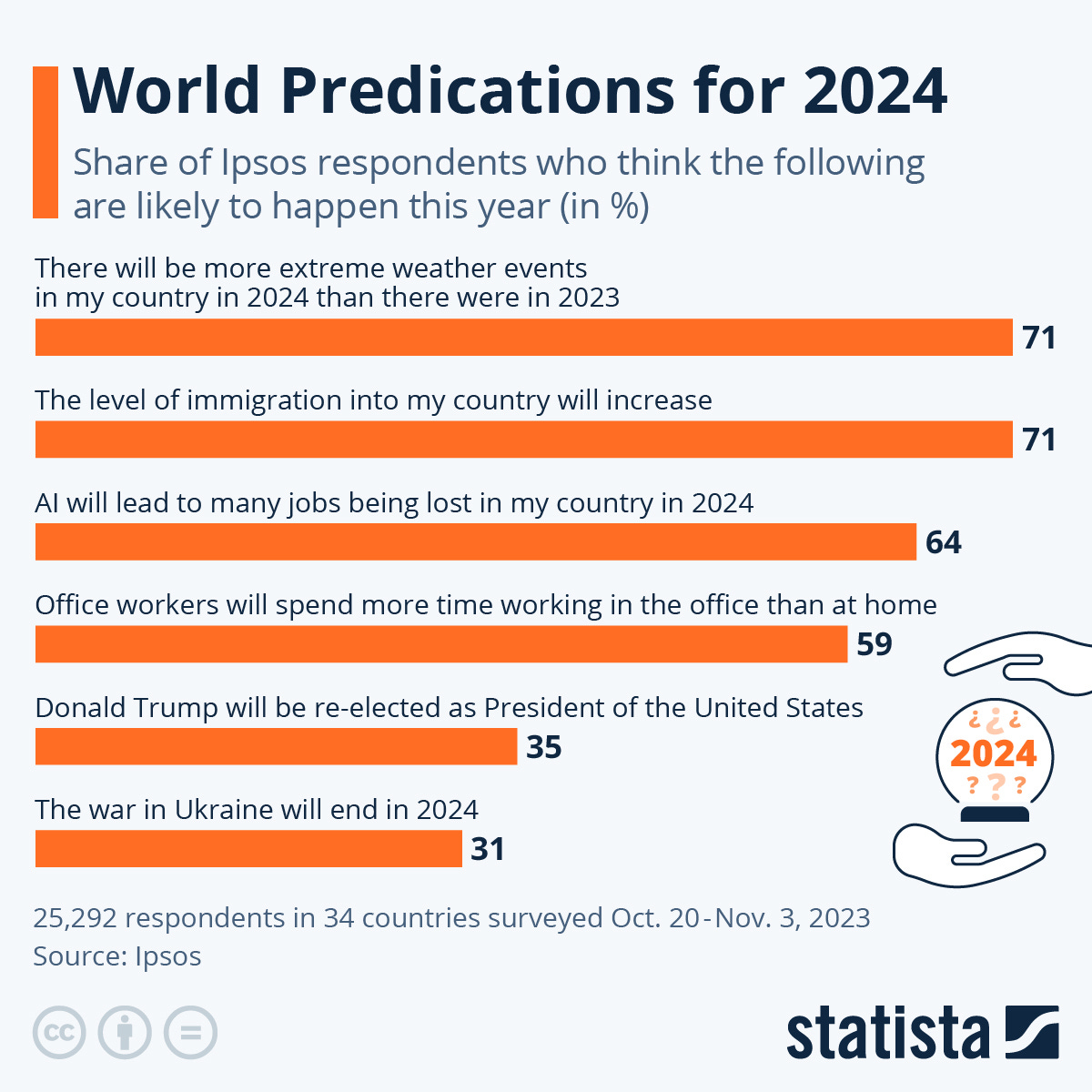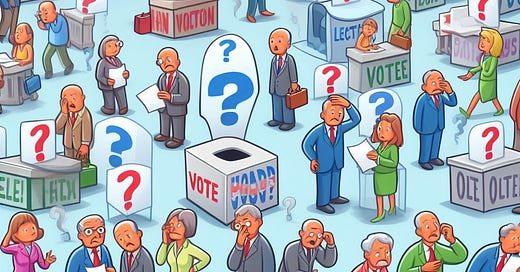This week…
Your reading time is about 6 minutes. Let’s start.
We’re a week into 2024, and among the personal highlights: I hopped on the wrong train home one evening, so things can only get better from here, right?
This year, there will be more elections globally than ever recorded. Some of these elections will take place in some of the most populous nations, including India, Indonesia, Mexico, Russia, and the US. Many of these countries see an increase in ethnic violence, weakening judicial systems, and other threats to democracy.
Last year’s elections indicate a trend to the far right, including Javier Milei’s win in Argentina and Geert Wilders’ victory in the Netherlands. Although Poland elected a new leader in Donald Tusk after previously being under a right-wing populist government, the centrist former president of the European Council declared this week that his government would refuse any relocated asylum seekers under the EU’s plans. Some countries, such as India and South Africa have yet to announce when they will head to the polls, but these countries have:
Bangladesh, Jan. 7
Taiwan, Jan. 13
Pakistan, Feb. 8
Indonesia, Feb. 14
Russia, Mar. 15-17
South Korea, Apr. 10
Mexico, Jun. 2
The U.S., Nov. 5
Ghana, Dec. 7
I was going to write, for each of the listed countries, what readers should look out for as the main electoral issues heading to the polls, but I’m glad to find that Sarah Shamim and Areesha Lodhi have done so for Al Jazeera. You can read it here.
Every country listed above is mentioned in the article, as well as the European Union election. South Korea is the only one missing, but you must have already read about the attempted assassination of the opposition leader, Lee Jae-myung of the Democratic Party of Korea. Lee lost in 2022 to Yoon Suk Yeol, in what is reported to be the closest presidential election in South Korean history. Lee has since been under investigation for corruption, charges which he said were politically motivated. Ji Da-gyum explains why the precarious country enters 2024 in a fog of uncertainties, in The Korea Herald.
And now, a selection of top stories on my radar, a few personal recommendations, and the chart of the week.
ICYMI: The Previous Block explained why lesbians don’t biologically exist (lol). CORRECTION NOTICE: The link to the third story was missing. Thank you to astute readers who alerted me. I have corrected it in the app/web version.Deepfakes deceive voters from India to Indonesia before elections
Rina Chandran for Context:
But countries including India, Indonesia and Bangladesh have recently passed laws to more closely police online content and penalise social media sites for content deemed misinformation, so platforms are "holding their punches", said Raman Jit Singh Chima, Asia policy director at advocacy group Access Now.
In these countries, "this election cycle is actually worse than the last cycle - platforms are not set up to handle problems, and they are not being responsive and proactive enough. And that's a very dangerous sign," he said.
"There is a danger that the world's attention is only on the U.S. election, but the standards being applied there, the effort being made there should be duplicated everywhere," he added.
Incredibly large voting populations with incredibly low preparedness for the inevitable.
Taiwan confronts China’s disinformation behemoth ahead of vote
Brian Hioe for Coda:
Despite — or because of — the stakes, Taiwan’s response to the challenge of Chinese election interference isn’t siloed in government ministries or the military. Just as civil resistance has to be embedded in society, the responsibility of defending the information space has been entrusted to an informal network of civil society organizations, think tanks, civilian hackerspaces and fact-checkers.
X kicked off 2024 by screwing up during Japan’s earthquake emergency
Jordan Pearson for Vice:
While misinformation was spreading on X, the platform limited a key source of real information about the disaster. NERV is a massively popular Japanese app owned by IT company Gehirn Inc. that shares emergency information using data provided by the Japanese Meteorological Agency. On X, NERV’s Japanese-language page has more than 2 million followers. As the disaster unfolded, NERV posted that X was limiting the number of posts it could make.
What I read, listen, and watch…
I’m reading We Do What We Do In The Dark (2022) by Michelle Hart. Reading this book, I felt like everything was happening in the shadows yet everything appeared clear to me. And maybe, it’s because I wasn’t looking at a piece of fiction but a version of myself. I went the Extra Mile and wrote a reflection (not a review!). It is 1,500 words. You can read it here:
Reflection: We Do What We Do In The Dark (2022) by Michelle Hart
·Less than an hour into the book, I posted this snippet on my Instagram story: Mallory moved to sit on the bed but the woman stopped her. “Clothes outside the home carried germs,” the woman said. I have never related to a character (the woman) so much, I joked, that as a simple person, that makes this book an instant contender for a 4+ star rating. When I …
I’m listening to an episode of Tech Won’t Save Us with Naomi Klein where host Paris Marx talks to the Doppelganger author about how the mirror world distorts our reality.
I’m watching journalist Barbara Serra confronting her own family's fascist history in this 2020 Al Jazeera documentary.
Other curious links, including en español et français:
“Substack faces user revolt over anti-censorship stance on neo-Nazis” by Alex Hern for The Guardian.
“How subtle forms of misinformation affect what we buy and how much we trust brands” by Giandomenico Di Domenico (Cardiff University) for The Conversation.
“Why have authoritarianism and libertarianism merged? A political psychologist on ‘the vulnerability of the modern self’” by Barry Richards (Bournemouth University) for The Conversation.
“Science and history cannot afford to be indifferent to each other” by Lorraine Daston and Peter Harrison for Aeon.
“How sharing your science in an opinion piece can boost your career” by Jane Palmer for Nature.
“Swedish-language media in Finland gets creative to stay afloat” by Emilia Jansson for IJNet.
“Alcaldes y gobernadores: a vacunar contra el populismo” por Francisco José Mejía en Semana.
“Mapas corporales: racismo, género y discriminación” por Eréndira Derbez en Gatopardo.
« Handicap visuel et nouvelles technologies : pourquoi le braille reste essentiel à l’heure du numérique » par Renaud Verstraete dans RTBF.
« Une année 2023 houleuse pour la consommation de nouvelles de CBC/Radio-Canada » par Catherine Lalonde dans Le Devoir.
Chart of the week
According to an Ipsos survey of 25,000 people across 34 countries, 35 per cent said Donald Trump will be re-elected as POTUS. Anna Fleck has the details for Statista.







